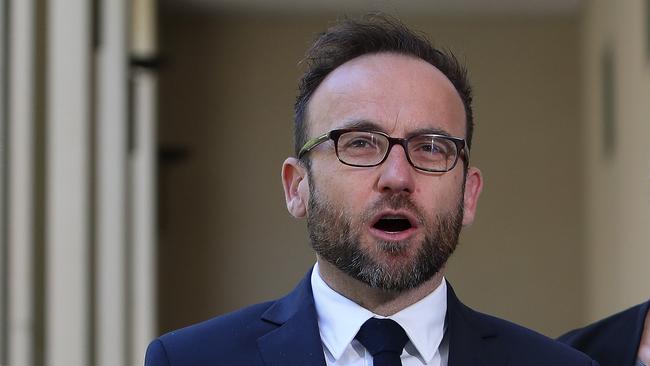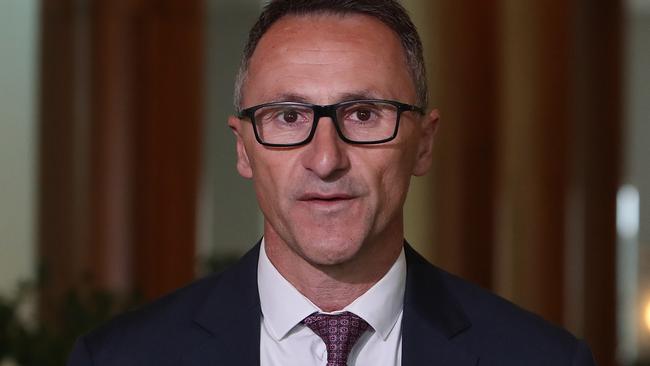Greens push to ban $25bn coal industry a challenge for Labor
Bill Shorten’s lack of climate detail lashed as Greens reveal plan to kill off coal export industry.

The Greens have promised to abolish Australia’s coal industry as it takes an end to exports and an 100 per renewable energy target within the next 11 years to the next federal election.
A Shorten government would face pressure from the Left to shut down coal-fired power stations and ban thermal coalmining amid the Greens new climate policy.
It would kill off the $25 billion-a-year export industry within a decade.
Australian coal exports brought in $248 billion in revenue to the nation in the last financial year, and Scott Morrison has launched a feasibility study into a new coal-fired power station in Queensland earlier this week.
Greens climate spokesman Adam Bandt will unveil the policy today that would ban coal-generated power in Australia and set out for the first time a plan to phase out the industry by imposing coal export quotas that would tighten each year.
The blueprint presents a challenge to Labor, which governed with the support of the Greens under Julia Gillard, and has committed to establish an independent statutory “Just Transition Authority” to mitigate the impact of coal-fired power station closures on regional communities.
“This is a plan to take on coal. If you don’t have a plan for coal, you’re not serious about climate change,” Mr Bandt said.
The radical plan would see carbon emissions slashed to zero by 2040 and Greens leader Richard Di Natale appeared to give little room to negotiation if he wins the balance of power in the Senate.
“Our job is to put a blueprint forward for what needs to happen. That’s our job,” he told ABC News this morning.
“Look at 2010, when you got Greens in the balance of power in the lower house and the Senate. We got a price on carbon, we got the Clean Energy Finance Corporation.
“We hope to find ourselves in that position again.”
The Greens’ radical plan today will likely fuel Coalition attacks on Labor that it could enter a similar pact to the one Julia Gillard signed with then-Greens leader Bob Brown to secure power in 2010’s hung parliament.
Senator Di Natale claimed today his plan would actually create jobs, despite coal remaining Australia’s number one source of energy and one of its top exports.
“This is a plan based on science, not on politics. At the moment, we’re facing a climate crisis,” he told ABC News today.
“Recognise that coal is the biggest contributor to climate change. And if we don’t have a plan to tackle coal, we don’t have a plan.

‘Managed energy transition’
The Greens platform comes as a climate change advisory group representing institutional investors sets out a plan for a “managed energy sector transition” to a 100 per cent renewable economy.
The Investor Group on Climate Change will today set out a framework to be adopted by funds managers representing 7.5 million superannuation investors in Australia and New Zealand to build an economy with zero net carbon emissions.
The group said investors would work with government to implement a policy response, including the introduction of a carbon price, to ensure the transition “delivers a prosperous economy”.
The Greens policy blueprint suggests Australia would become a “renewable energy superpower”, with coal exports to be replaced by clean hydrogen, and the construction of a $6bn taxpayer-funded energy grid upgrade to develop new renewable energy zones.
Australia’s coal exports were forecast to hit $67bn in 2018-19, including about $25bn worth of thermal coal — a 14 per cent jump from the previous year.
The Coal Council of Australia branded the Greens platform as “economic vandalism” that would threaten up to 150,000 direct and indirect jobs, and hit the governments of NSW and Queensland with the loss of $2.5bn in annual royalties.
Labor has pledged a 45 per cent cut to carbon emissions but has so far refused to say whether the target would be applied evenly across all economic sectors, or whether it would use carried-over credits from over-achieving on the Kyoto agreement to lower Labor’s carbon abatement task.
Scott Morrison said: “Bill Shorten cannot explain to anyone in this country even the most basic answers to questions on his target.”
Labor’s climate change spokesman Mark Butler declined to comment.
A report by the International Energy Agency this week revealed that the world’s growing thirst for energy had led to higher emissions from coal-fired power plants.
Energy demand around the world grew by 2.3 per cent over the past year, the most rapid increase in a decade.
— with Richard Ferguson




To join the conversation, please log in. Don't have an account? Register
Join the conversation, you are commenting as Logout